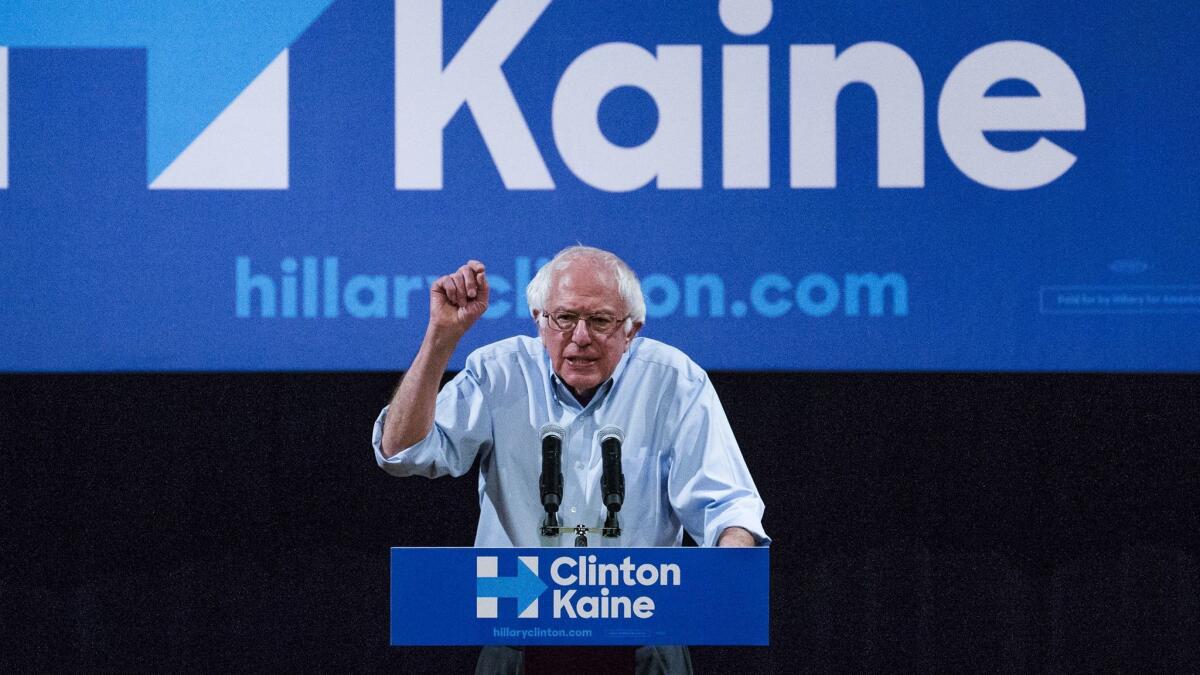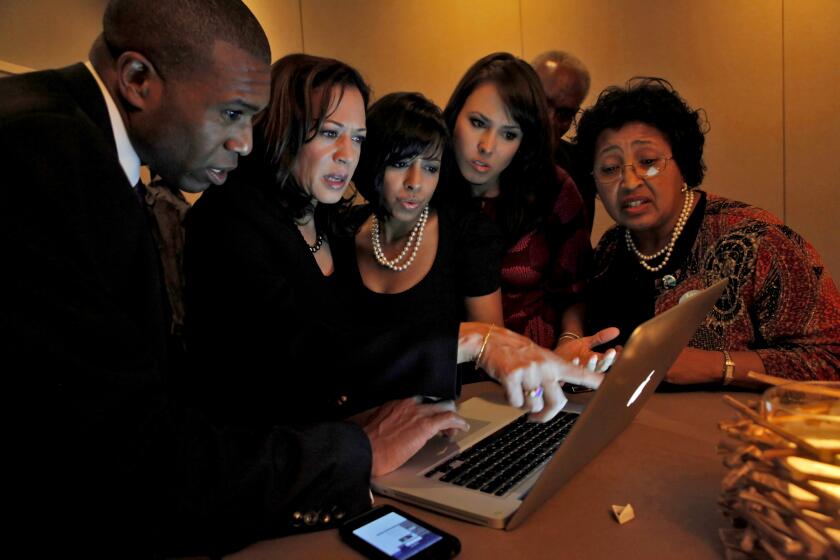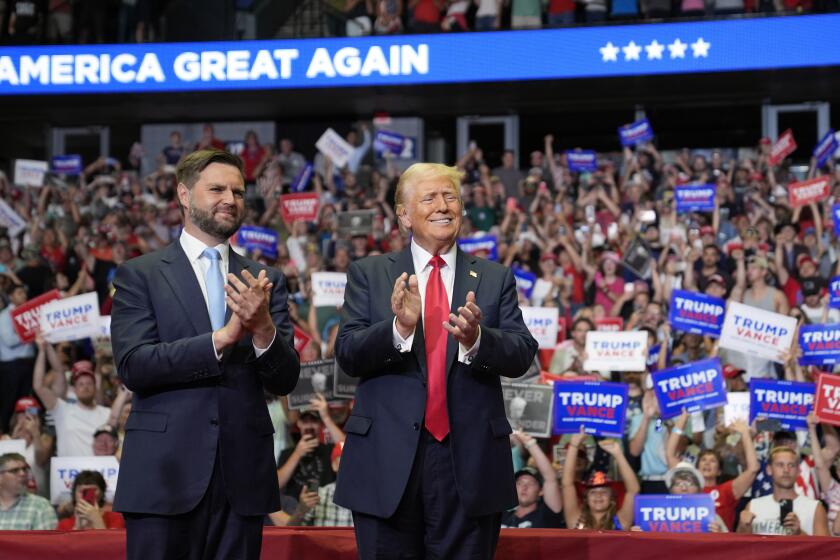Op-Ed: Jewish Americans don’t vote with Israel in mind, they vote as liberals

Although Jewish Americans represent just 2% of the population, politicians — and would-be politicians — have long considered the “Jewish vote” a prize worth pursuing. That’s actually not irrational. Jews contribute a disproportionate amount of money to political candidates and causes; many Jews live in the swing states of Florida (846,700 of 19.9 million), Pennsylvania (324,700 of 12.8 million), Ohio (173,700 of 11.6 million), and Michigan (105,200 of 9.9 million); and Jews tout a stellar turnout record of 80%, according to multiple sources.
It sometimes feels, nonetheless, like many campaigns are stuck in a time warp, or rather an alternate universe. They’re spending thousands of dollars — and in some cases millions — to sway Jewish voters chiefly based on the false notion that Israel is terribly important to a majority of Jewish Americans.
Israel was the “most important” voting issue for a mere 4% of respondents in the Public Religion Research Institute’s 2012 Jewish Values survey. Israel was one of two top “voting issue priorities” for just 10% in a J Street poll conducted around the same time. More recently, “U.S.-Israel relations” was the most important issue for only 7.2% in the American Jewish Committee’s 2015 study of Jewish American opinion, ranking fifth behind “economy” (41.7%), “national security” (12.3%), “healthcare” (12%), and “income inequality” (11.6%). It was the second and the third-most important issue for only 7.6% and 11.1%, respectively.
Israel was the ‘most important’ voting issue for a mere 4% of respondents in the Public Religion Research Institute’s 2012 Jewish Values survey.
The relevance of Israel to mainstream Jewish Americans will further diminish due to various secularizing factors. Recent years have seen profound assimilation and a high rate of marriage outside the faith among non-Orthodox Jews. (Since 2000, the rate has been more than 70%.) Additionally, the donor generations of Jewish Americans, those who remember the existential crises of the 1967 Six-Day War and the 1973 Yom Kippur War and who chiefly fund Zionist institutions, are growing old. They were the last Jewish Americans raised when Israel was widely viewed as a David, a valiant democratic-socialist experiment, rather than a Goliath, a repressive neo-imperialist undertaking.
Indeed, the Pew Research Center’s landmark 2013 survey “A Portrait of Jewish Americans” found that caring about Israel was an “essential part of being Jewish” for 53% of Jews 65 and older. By comparison, only 32% of Jews 18 to 29 expressed that same sentiment. It’s also estimated that Jews constitute at least 20% of the Boycott, Divestment, and Sanctions Movement. And take what you will from this: American Jewry was effectively split down the middle over the Iran nuclear deal, which made the community’s support for the deal 20 percentage points higher than for Americans overall.
If not Israel, what does fire up Jewish Americans? In short, the Jewish precept of tikkun olam (“repairing the world”), construed by modern mainstream denominations to mean “social justice.”
When Pew broadly asked, “What’s essential to your Jewish identity?,” “caring about Israel” (43%) was rather handily beat out by “leading ethical/moral life” (69%) and “working for justice/equality” (56%). Mainstream Jews are, therefore, less concerned with the details of the U.S.’ latest military aid package than, for instance, candidates’ positions on abortion access and gay marriage.
I’ve emphasized the term “mainstream” because non-Orthodox Jews (i.e., Jews who aren’t Torah observant) currently make up 90% of American Jewry. Orthodox Jews, conversely, trend politically conservative, leaning 57% Republican to 36% Democratic in the Pew survey. (The writer Armin Rosen recently predicted that GOP presidential candidate Donald Trump is likely to gather the bulk of the Orthodox Jewish vote.)
Pragmatically, then, pundits and pollsters who want to understand American Jewry ought seriously to consider the following: The political behavior of the preponderance of Jewish Americans is in no way substantively different than that of secular liberals of any other religious background. Reform Judaism has been called “the Democratic party platform with holidays thrown in,” and the services in a Reform temple have been described as “the Democratic Party at prayer.”
Nor is the association between Jews and the Democratic Party a new phenomenon. Since exit polling began in 1972, Democratic presidential candidates have received on average 70% of the Jewish vote. In fact, according to several scholars, the 1920 presidential election was the last contest for the White House in which the Republican candidate bested the Democratic candidate among Jewish voters. And that was because the Socialist candidate, Eugene V. Debs, siphoned support from the Democratic candidate, Ohio Gov. James M. Cox, capturing 38% of the Jewish electorate.
Personally, I’ve grown accustomed to Reform and even Conservative rabbis using — and arguably exploiting — the pulpit, especially during the High Holidays, to advocate for public policies virtually unilaterally endorsed by the Democratic Party (e.g., universal healthcare and gun control). Still, I was taken aback this year when a rabbi in my hometown used her sermon to preach the benefits and necessity of electing America’s first female president. I’m no constitutional scholar, but that action would seem to be a violation of her institution’s 501(c)(3) tax-exempt nonprofit status.
The “Jewish vote” matters, but most Jewish Americans don’t vote as Jews; they vote as liberals.
Jonathan Bronitsky (@jbronitsky) is a political historian writing a biography of Irving Kristol, to be published by Oxford University Press. This piece was adapted from the Manhattan Institute’s City Journal.
Follow the Opinion section on Twitter @latimesopinion or Facebook
More to Read
A cure for the common opinion
Get thought-provoking perspectives with our weekly newsletter.
You may occasionally receive promotional content from the Los Angeles Times.






